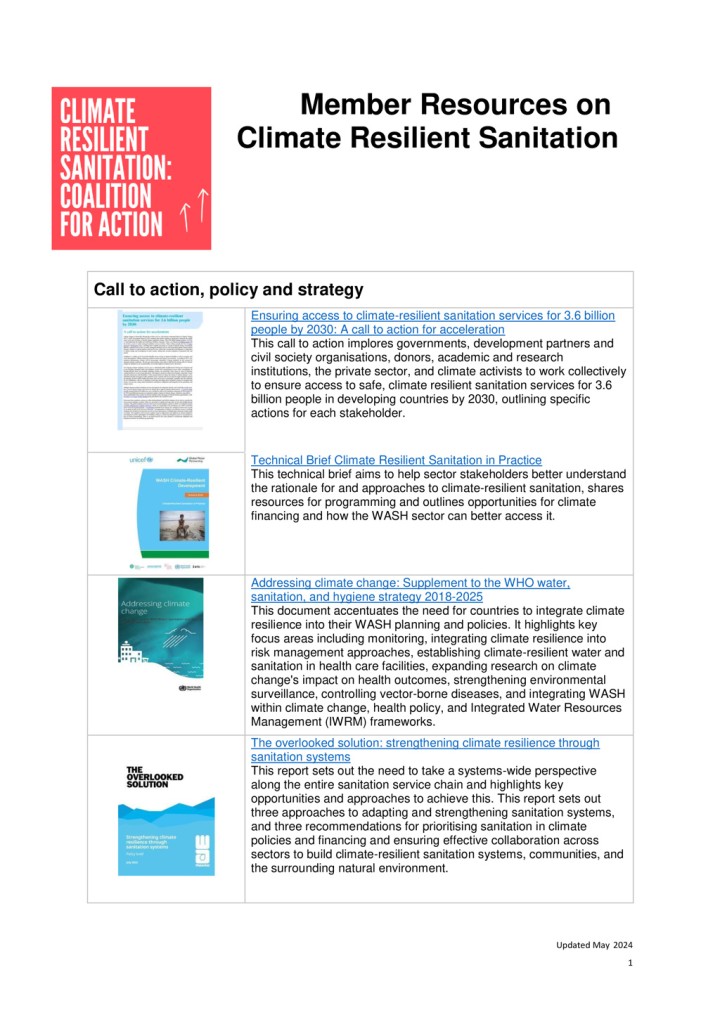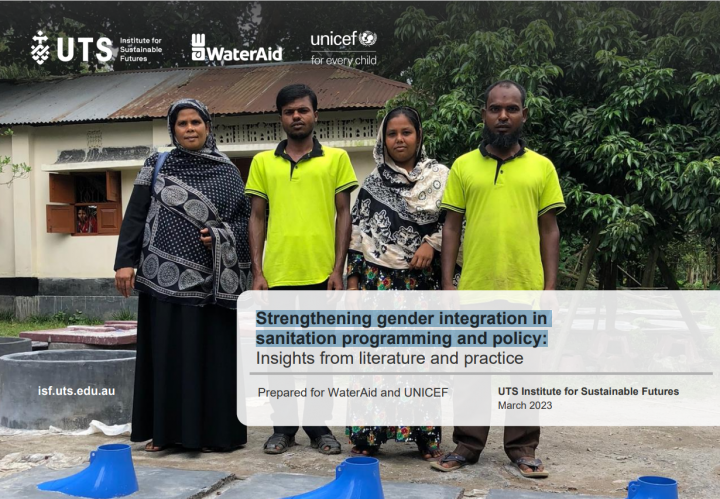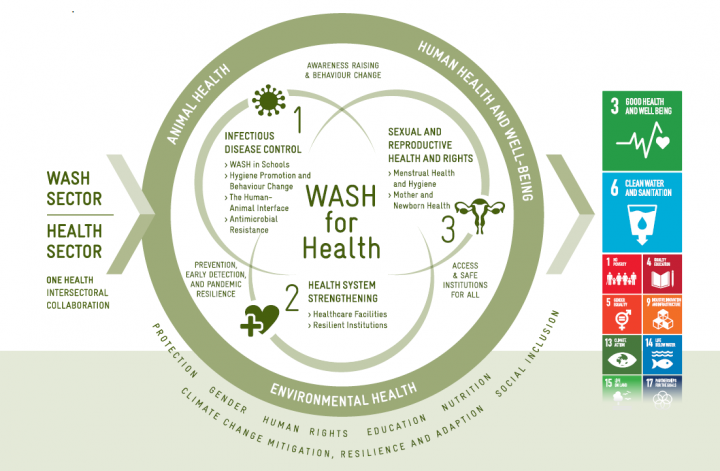SFD Promotion Initiative (2024) SFD Review Procedure - Portuguese
O procedimento de revisão de cinco passos desenvolvido pela iniciativa de promoção de SFD garante a padronização de todos os relatórios SFD publicados no Portal Web de SFD. Teremos o prazer de fornecer comentários sobre o seu relatório SFD. Um membro do grupo de especialistas fornecerá comentários sobre a avaliação e orientará você através da verificação de qualidade para finalizar o seu relatório SFD. Uma vez […]
SFD Promotion Initiative (2024) SFD Review Procedure - Spanish
El procedimiento de revisión de cinco pasos desarrollado por la iniciativa de promoción de SFD garantiza la estandarización de todos los reportes SFD publicados en el Portal Web de SFD. Estaremos encantados de proporcionarle comentarios sobre su reporte SFD. Un miembro del grupo de expertos le proporcionará comentarios sobre la evaluación y lo guiará a través del control de calidad para finalizar su reporte SFD. Una […]
SFD Promotion Initiative (2024) SFD Review Procedure - French
La procédure d'examen en cinq étapes développée par l'initiative de promotion des SFD garantit la standardisation de tous les SFD publiés sur le portail web. Nous vous offrons la possibilité d’une révision de votre rapport SFD. Un membre du pool d'experts vous fournira des commentaires sur votre évaluation et vous guidera à travers le contrôle de qualité pour finaliser votre rapport. Une fois cette étape franchie, […]
GFA Consulting Group GmbH (2019) SFD (Lite) Report - Masekelo and Ndala, Tanzania
Masekelo ward and Ndala ward are the selected project areas in Shinyanga for the GIZ “Scaling up of access to water supply and sanitation services in under-privileged urban areas”. It is currently implementing a scaling up project to connect the wards for the first time to piped water from surface water source through the Shinyanga Urban Water Supply and Sanitation Authority (SHUWASA) water supply network. […]
GFA Consulting Group GmbH (2018) SFD (Lite) Report - Ng’hong’ohna Mtaa Tanzania
Ng’hong’ohna Ward (which covers practically the same area as Ng’hong’ohna Mtaa) is one of the 41 wards located in Dodoma City. It is located on the south-eastern part of the city covering an area of 130.675 m² (Dodoma Municipal Council, 2017). The area is characterized by a broad upland plain and located between hills bordering the University of Dodoma. The current total population for the […]
GFA Consulting Group GmbH (2019) SFD (Lite) Report - Shinyanga Municipality, Tanzania
Shinyanga Municipality is the headquarters of Shinyanga Region and is in the northern area of Tanzania. It lies between latitudes 30 30' and 30 45' South and longitudes 330 20’ and 330 35’ East, about 1,000 kilometres from Dar es Salaam and 165 kilometres from Mwanza City. According to Tanzania’s National Bureau of Statistics (NBS, 2018), the projected population of Shinyanga Municipality for 2017 is 178,890 […]
GFA Consulting Group GmbH (2018) SFD (Lite) Report - Dodoma City, Tanzania
Dodoma City Council is located at the south-eastern end of the Tanzania Central Plateau at an elevation of 1,200 metres above sea level with coordinates 6°10′23″S 35°44′31″E. The city council is divided into 41 wards and Mtaas (streets) and covers an area of about to 2,769 sq. km. The 41 wards are grouped into four divisions. Currently, the population of Dodoma Municipal is estimated to […]
Climate Resilient Sanitation Coalitation (CRSC) (2024) CRSC - Member Resources on Climate Resilient Sanitation
Enclosed you can find the Climate Resilient Sanitation Coalition Member Resources.
ENPHO (2024) SFD (level 2) Report - Shaarada Municipality, Nepal
Shaarada Municipality is situated in Salyan District of Karnali Province in the western region of Nepal. It is divided into 15 wards and covers an area of 198.34 sq. km. It was officially established on May 16, 2014 As per the national population and housing census conducted in 2021, Shaarada Municipality has a total population of 34,663 with 16,388 male and 18,275 female population. It […]
ENPHO (2024) SFD (level 2) Report - Janakpurdham Sub-Metropolitan City, Nepal
Janakpurdham Sub-Metropolitan City is situated in Dhanusa District of Madhesh Province in the southern region of Nepal. Formerly, it was established as Janakpur Sub-metropolitan City on 1960. Later on 2014, it was re-named as Janakpurdham and changed the sub-metropolitan city to sub-metropolitan city. It is divided into 25 wards As per the national population and housing census conducted in 2021, Janakpurdham Sub-Metropolitan City has a total […]
ENPHO (2024) SFD (level 2) Report - Tilottama Municipality, Nepal
Tilottama Municipality is in Rupandehi District, Lumbini Province of Nepal (MoLFM, 2016). The municipality was established on 8 May 2014. It has a total of 17 wards and covers 126.19 square kilometres of area. It is surrounded by Butwal Submetropolitan City in the north, Siddharthanagar Municipality and Omsatiya Rural Municipality in the south, Rohini River and Devdaha Municipality in the east and Tinau River, Sudhdhodhan […]
PWA, Municipality of Kharas, WWn and JSC (2024) SFD (level 2) Report - Kharas, Palestinian territories
Kharas is a Palestinian village in Hebron Governorate, located 12 km northwest Hebron city, in the south of the West Bank. The village is located within the southern Palestinian mountains, to the north of Wadi Arab. The village is surrounded by Halhul to the east, Nuba and Beit Ula to the south, Surief to the north and the Green Line to the west. The population of […]
PWA & World Waternet (2024) SFD (level 2) Report - Salfeet, Palestinian territories
Salfeet is located in the middle of the West Bank. It is bordered by the Ariel settlement and Marda village to the north, Nablus Governorate to the east, the Green Line (the 1949 Armistice Line) to the west, and Ramallah Governorate to the south. As a region, Salfeet covers a total land area of 27 km2. The 2021 population is 11,873 inhabitants (PCBS, 2021) with […]
SuSanA (2023) Network Circle Newsfeed (NCN)
The idea of a WASH Network Circle was born in 2022 from bilateral discussions between SuSanA and other networks, who expressed the need for key networks in the WASH sector to harmonise their activities and identify synergies. The WASH Network Circle was officially launched in Bonn in May 2023 during a meeting hosted by GIZ. Key networks including IWA, FSMA, GWOPA, pS-Eau, SSWM, SWEP, WIN, […]
Department of Education Philippines (2023) WinS Monitoring Results - School year 2017/2018 to school year 2021/2022
Water, Sanitation and Hygiene (WASH) in Schools program in the Philippines has improved significantly over the past years of implementation and contributed to the health and well-being of school children. The program started in 2016 through the DepEd Order No. 10 S-2016 titled “Policy and Guidelines for the Comprehensive WASH in Schools (WinS) Program”. This policy has able to set specific parameters and standards for […]
Avni Kumar, Jess MacArthur, Professor Juliet Willetts (2023) Strengthening gender integration in sanitation programming and policy: Insights from literature and practice
The integration of gender equality and inclusion within water, sanitation and hygiene (WASH) service provision is critical to ensuring sustained and equitable access. Efforts to integrate gender considerations in the WASH sector have evolved from an instrumental approach towards a more transformational approach that supports dual outcomes in WASH and in gender equality more broadly. This report presents the results of a rapid review of […]
ENPHO (2023) SFD (level 2) Report - Urlabari Municipality, Nepal
Urlabari Municipality was declared as municipality on 8th May 2014. The municipality is located in Morang District, Koshi Province. The municipality is divided into nine political wards. The municipality has total 70,908 population with 33,356 males and 37,552 females (Census 2021, n.d.). Basic sanitation coverage in the municipality is 100%. All the surveyed households in the municipality have access to basic toilet facilities. Among the […]
ENPHO (2023) SFD (level 2) Report - Tansen Municipality, Nepal
Tansen Municipality is one of the oldest municipalities in the country, established in March 1950. It is located in Palpa District, Lumbini Province. The Municipality has a total of 14 political wards. Tansen Municipality occupies an area of 109.8 square kilometres. The municipality has a total population of 50,792 with 23,414 males and 27,378 females (Census 2021, n.d.). Palpa District was declared as an open defecation […]
Manolakos, D. and Schmitz, N. (2023) Discussion Paper on WASH for Health - Prevention is the best medicine (2.0)
The WASH for Health approach presents significant opportunities for advancing not only SDG 3 (Good Health and Wellbeing) and SDG 6 (Clean Water and Sanitation) through improving public health outcomes, including WASH in infectious disease control, health system strengthening, and sexual and reproductive health and rights. Adopting the One Health approach provides a broader perspective, facilitating the integration of key action fields shared by the […]
Santiago SEPTIEN STRINGEL, Pareshin NAIDOO, Akhil RAMLUCKEN, Freddie INAMBAO, Craig MCGREGOR, Jon POCOCK, Anusha SINGH (2023) Development of an In-Situ Faecal Sludge Solar Dryer at Pilot-Scale WRC Final Report of the Project K5/2897
The present project (K5/2897) was about the development, testing and evaluation of two prototype solar thermal drying technologies for the treatment of faecal sludge, namely a greenhouse-type solar dryer and a screw conveyer, and it included a pre-feasibility study. The prototype testing showed that, temperatures between 35 and 45°C could be obtained with peaks up to 50°C, as well as relative humidities lower than 40%, […]















